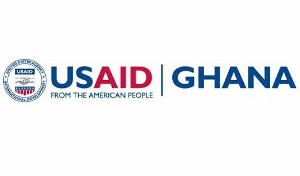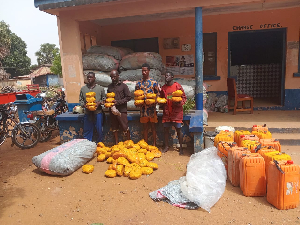The United States Agency for International Development (USAID) study on the impact of trade-related fees and charges in Ghana shows a lack of transparency as traders are usually unclear about the fees and charges. The study, which examined Ghana’s compliance with the World Trade Organisation Trade Facilitation Agreement’s Fees and Charges, found out that a consolidated list of trade-related fees and charges was not easily accessible.
“Traders are unclear of what ends up being paid to the Ministries, Departments and Agencies, what is paid in unofficial fees and how much goes directly to the freight forwarder,” the report stated.
Mr Robert Jackson, the US Ambassador to Ghana, launched the study dubbed ‘the Cost of Trading in Ghana’ at the monthly luncheon of the American Chamber of Commerce.
High-level Ghanaian government officials and members of the private sector attended the event.
The study detailed how official and unofficial fees and charges associated with trade impacted Ghana’s trade volume, government revenues, and private sector viability.
Ghana undertook the study as part of its efforts to comply with benchmark guidelines in the World Trade Organisation’s Trade Facilitation Agreement.
He said the Trade Facilitation Agreement, which went into effect on February 22, contained provisions for expediting the movement, release, and clearance of goods.
He also set out measure for Effective Corporation between customs and other appropriate authorities on trade facilitation and custom compliance issues.
The Organisation for Economic Cooperation and Development estimate that implementing the Trade Facilitation Agreement could reduce worldwide trade costs by as much as 17.5 per cent, with the greatest benefits accruing to African and developing countries.
At the event, Ambassador Jackson stressed that adoption of the study’s recommendations and implementation of the Trade Facilitation Agreement would foster increased economic growth in Ghana.
“Ghana has tremendous potential to be ‘the trade gateway of Africa’,” he said.
“The United States will work with you to create an enabling business environment that builds on your economic and political stability and creates jobs for the citizens of both countries,” he added.
Ghana became a member of the World Trade Organisation more than 20 years ago, in 1995 and became the 95th country to ratify the Trade Facilitation Agreement, the first multilateral deal concluded in the WTO’s 22-year history.
“We applauded Ghana for the role it played in advancing what many refer to as “the greatest trade reform for a generation.”
He explained that rationalising and reducing port and custom fees and charges does not necessarily mean lost revenue.
“There are benefits to eliminating “nuisance fees and charges,” and to ensuring that when fees and charges are paid out, they are commensurate with service provision, adding that such actions are attractive to business and facilitate increased trade.”
USAID works with the Ghanaian government and private sector to target keys barriers to trade and investment, and promote regional integration and trade competitiveness.
It aims to increase intra-regional Africa trade and exports to the U.S. and reduce the time it takes to import or export from ports to land locked interiors on the continent.
USAID is the lead U.S. government agency that works to end extreme global poverty and enable resilient, democratic societies to realise their potential.
It supports Ghana to increase food security, improving basic health care, enhancing access to quality basic education, and strengthening local governance to benefit all Ghanaian people.
Business News of Thursday, 29 June 2017
Source: ghananewsagency.org
USAID examines impact on trade-related fees and charges in Ghana
Entertainment












